Not-so-free beach
I spent a couple of afternoons on free beaches in Salerno. Carmine had pointed to a few of them on our first day orientation drive around the city.
“How are the free beaches?â€Â I’d asked. The idea of paying to sit in the sand is a foreign concept to someone from Oregon. The beaches in the state are all considered public. All of them. Every grain of sand.
In Salerno, however, probably 80% of the sand is contained within fences and barriers, cordoned off into color-coded parcels marked by striped umbrellas.
Early into the trip I’d decided to take a run over to one of the free beaches that was halfway between our apartment and downtown Salerno. It was about a 20 minute run, perfect on a hot day. I packed up my towel, water bottle and book. I left anything valuable, including my camera and ID home.
When I returned with my aunt, a week or so later, however, I made sure I had my camera. The scene was just too rich to miss. I’d risk it.
The walk to the strip of beaches took us through the underground passage for the under-construction train station, along stretches of abandoned private beach resorts, and past an ancient lighthouse.
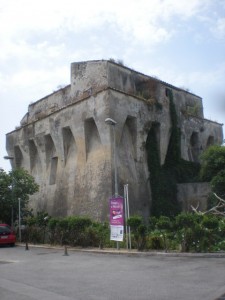
The day was really quite hot, and the humidity was pushing us into the realm of uncomfortable. We laughed as we walked past a disembodied room fan on the sidewalk.
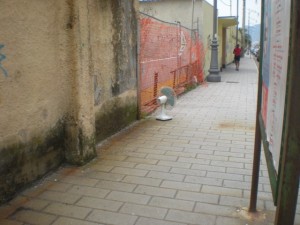
The Ant was a trooper throughout the trip. Whether walking too far along the beach, or dragging a suitcase over the bridges of Venice, she only occasionally asked me if we were there yet. Today, though, I could sense that she was wondering whether I had sent her on a death march.
“We’re almost there,†I said, pointing at the cabanas we were passing on our left. “We just have to go past these ones with red roofs, then some blue ones, and then the other red ones.â€
Almost there. What it really meant was that I knew where we were and where we were going. Not that we were, actually, close. The Ant knew this.
“Okay,†she nodded. I knew she wasn’t convinced.
Forty-five minutes, and several water-stops later, we were there, at the free beach, staking out our spots, and taking in the scene.
Free beaches are free for a number of reasons:
- Nobody cleans up the trash that is washed up or left behind.
- There is no shade.
- There is no fresh water, either for drinking or washing.
- Beach vendors are allowed to walk along, and peddle their wares to anyone and everyone, relentlessly.
The vendors are easily enough dealt with. A simple, “No, grazie†said firmly, and often, even over the top of the low-toned pitch, will almost always work. It’s just that the process has to be repeated every 2-7 minutes as a new vendor, always a young man, and almost always a dark-skinned African immigrant, wanders by, tries to catch your eye, moves in close, and presents his product. Sometimes it’s beach toys. Other times clothing, or bolts of fabric. Once in a while it’s jewelry or small pieces of art.
They start in Italian, then move to English, or German, or whatever language they determine will garner the most response. With each firm, “No, grazie†I lament my inability to connect on a human level. Eye-contact always prolongs the interaction, serving as a kind of affirmative response to their wares.
In the US, I will usually take the time to look a street vendor in the eye before saying, “no thanks.â€Â But here, in a less-familiar place, I feel unable to do so. And saddened by that reality. I also feel humbled. As I listen to these men, watch them comb the beaches for the few Euro they will make each hour, I am incredibly humbled by my ignorance. And my privilege. That’s not a word I use lightly, but it feels apt here. I speak one language. I know a few words of Spanish and a few of Italian. Not enough to get by selling garments on a beach. My fear of misspeaking gets in my way. Yet these beautiful vendors speak unabashedly with me, passing through their rotating vocabulary, hoping to hit on a language familiar to me. And here I sit, with the great good fortune to say, “no, grazie.â€
Today, though, the vendors were light, leaving us room to take in the vignettes unfolding before us.
What I had found most interesting on my first trip to the beach was the gender dynamic that was so heady. The boys were in one area, and the girls in another. There was one girl that ventured into the area up against the paid beach wall where the boys had claimed the shade. She had a bemused look on her face the entire time. Crouching inside the protection of her towel, as though she wasn’t sure how she’d managed to put herself there, and not entirely sure it was a good idea.
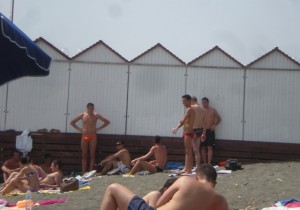
The rest of the girls were traveling in packs, venturing into the water, and out again, inching closer to the boys that were playing soccer in the foamy sand. Interactions between the genders were punctuated by raucous clashes: sand kicked at a girl, and the resulting screech.
More interesting, though, was the interaction between the boys.
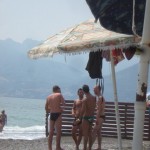
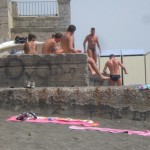
It has taken me a while to become comfortable with the overt sexuality that is part of Italian culture. It seems strange to some people, that the country that is home to the Vatican is so sexually charged. Yeah, it’s a little weird, but it’s there. And on the beaches, the sexual electricity that lies just below the surface was almost alarming to a kid who grew up in a country like the US.
Laying on my little towel, I peeked from under my hat and over my sunglasses to watch.
The four boys in front of me looked like they were maybe 19, maybe 20. Old enough to have the bodies of men, but still awkward in their bravado, adjusting their tiny bathing suits, and opting to let the sun reflect off of their wet bodies, rather than towel off.
They would take turns hoisting their well-tanned bodies from the sand and diving into the sea to cool off. They would emerge, and with a well practiced move, brush the water from their hair to good effect, leaving it spiky, erect, interesting. Then they would lie down next to each other to let the sun dry them.
The girls would scamper around the sand, pretending not to notice, adjusting their equally tiny suits and making sure the ball they were kicking around would drift into the boys’ line of sight every so often.
For their part, the boys seemed honestly disinterested in the girls. They took more interest in each other, leaning on each other’s shoulders, laughing together. At least most of them. Twice I watched as two older-looking guys came over and asserted their dominance – physically and directly.
First was someone who seemed to be a friend. His towel was positioned with the other 3 in front of me. In his racy red suit and shaved head, he was more muscular than the others. Throwing all of that muscle on top of one of the smaller boys, he crushed his body into the other, almost the way a wrestler would dominate an opponent.
Hips ground into the other, arms pinning the smaller boy’s arms above his head, the bigger boy laughed into his ear as the others watched. Then, when he’d decided the emasculation was enough, he rolled over onto his own towel, and all returned to normal. Except for me. I was a little scarred.
About a half hour later, as I was just getting over the first exchange, a much older and bigger boy with a tattooed leg, and longer shorts made his appearance on the beach. He was apparently known to many on the beach. “Nicola!†came the cries from different areas. It wasn’t clear to me whether he was loved or feared. Only that he was known. He made a wide circuit, strutting from group to group, his soft body a contrast to the younger, more athletic boys. His tattoo a brazen one, taking up the entirety of his left calf.
After spending time with the group along the wall, and kicking the soccer ball out of the group at the water’s edge and into the ocean, he came over to my boys. Only one of them was on his stomach. Nicola headed straight for him, and dropping his body down, placed one knee roughly in the other boy’s lower back, apparently trying to separate his hips from the rest of his body.
The boy screamed, actually screamed as Nicola pinned his arms to his side and laughed. The others looked nervously over, but they only watched as their comrade struggled fruitlessly to move out of the hold, crying out, “Nicola, basta!â€Â When he decided it was enough, Nicola released his hands, and pushed off of the boy, up to a standing position, still laughing.
The boy did nothing. He lay there, and adjusted his suit. Nicola greeted the others. It wasn’t a friendly greeting he received. Just a nod and maybe an embraced hand. Not like the hugs and heads leaned onto each other’s shoulders. This boy, this bully was both enforcer and violator. His presence was accepted, expected, but not appreciated.
Nicola walked away. He had no towel. He had no group. He had no girls looking slyly at him, or boys welcoming him. I didn’t see where he went as I gathered my towel and book and headed out.
On the way home from our beach excursion, the Ant and I stopped for an emergency gelato. Along the dingy street that led to the underpass, we ducked into a nondescript bar with a dark-browed man behind the counter. He peered at us, clear strangers in this locals’ bar.
We smiled our hellos, and moved toward the unpromising gelato case. The flavors were meager, and clearly not house made. But we were in a bad way, so it would have to do.
As soon as he saw us move toward the case, he melted. Whether we reminded him of family members, or he just liked gelato, too, he patiently waded through our butchered Italian, and soon enough we had lovely cones of respite. We sat in the cool shop and ate quietly, the World Cup showing in the background.
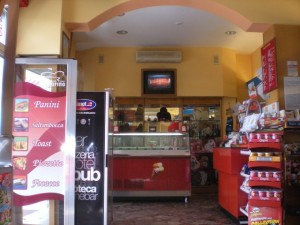
When we stood to leave, the shop-owner called to us in a friendly tone, and we waived, the familiar, “Ciao! Grazie!†tossed back and forth.
In the now-short blocks home, we walked, looking down the alleys that led from the ramshackle street to the beach. I pulled out my camera to capture a boat I’d noticed before. And, as I raised the camera, something caught my eye.
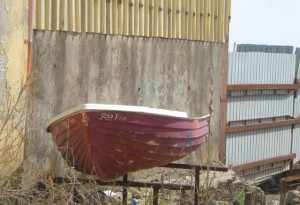
“Redfish.â€Â The white name scrawled along the dusty red hull of the rowboat rang out to me, the name of the lake and the beach where I’d spent my childhood summer weekends. The place where I’d played with the boys and watched the girls. The little boat smiled back at me, playful and comforting.
June 30, 2010 1 Comment
Free is Good
Portland is a giving city.
Many places have community gardens. There are lots of cities where people put their old furniture and appliances on the curb with a “free” sign.  Portland, it seems, takes it a step further.
Like a lot of places, Portland is experiencing a renaissance of home vegetable gardens.

One of my co-workers brings in tomatoes from her garden, another brings in basil. Another brings in squash and cucumbers from her family’s garden. We share produce and recipes and the things that we make. One of my co-workers even lives in a neighborhood where they share produce in a community overflow box. Whatever overflow a family has from their garden, they put in the box, and other families trade for produce of their own. Brilliant.
Just down the street from where I live, there’s a funky house that uses almost every square foot of its yard to grow food. Sprinkled in the beds are children’s toys and ceramic figures. In the strip of dirt between the sidewalk and the street sits a box labeled “FREE,” where the owners of the house place all manner of useful items. Depending on the time of the year, the box holds shoes, gloves, blankets and coats.
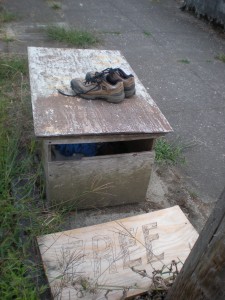
It’s a little box of humanity, allowing those in need to help themselves, without having to knock on a stranger’s door and ask.
This week, when walking to dinner, I happened upon this. If free is good, why not take it a step further and give someone their own door?


I mean really, why not?
August 16, 2009 Comments Off on Free is Good


